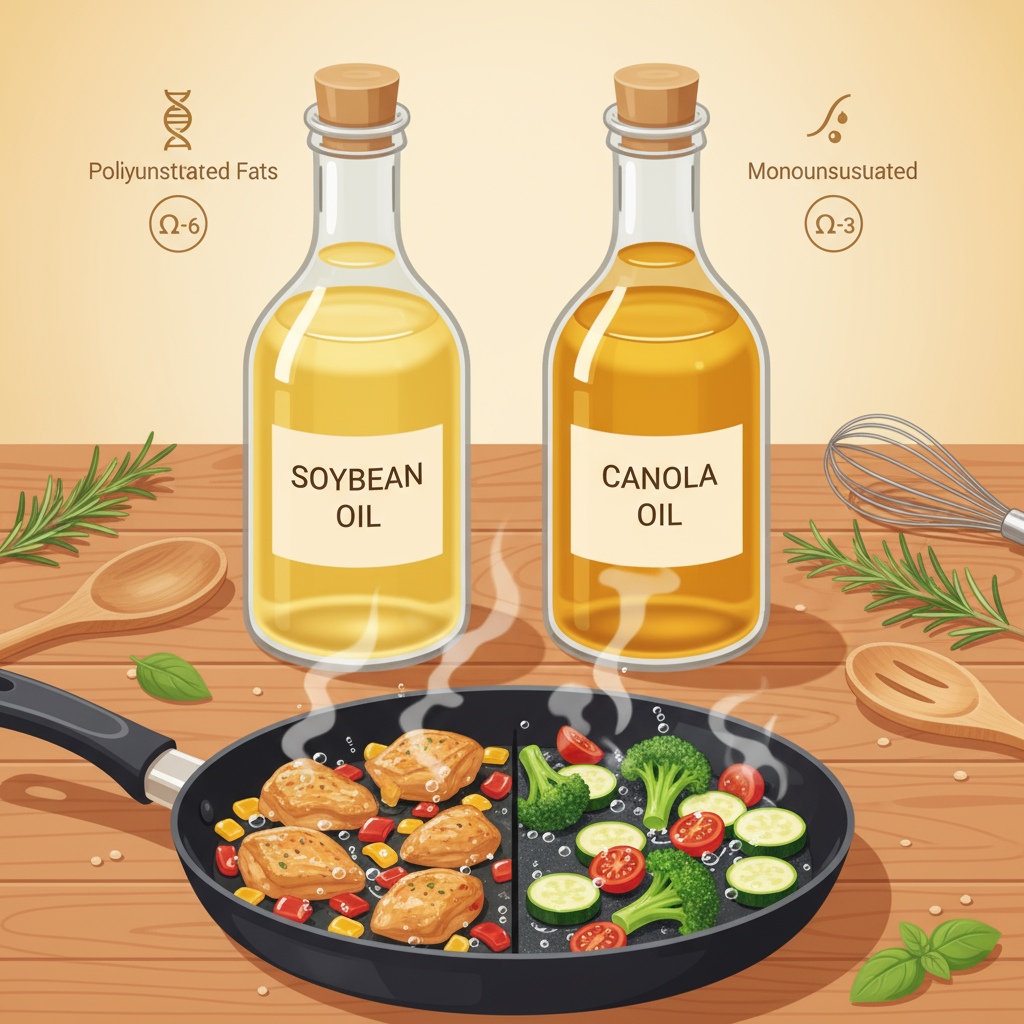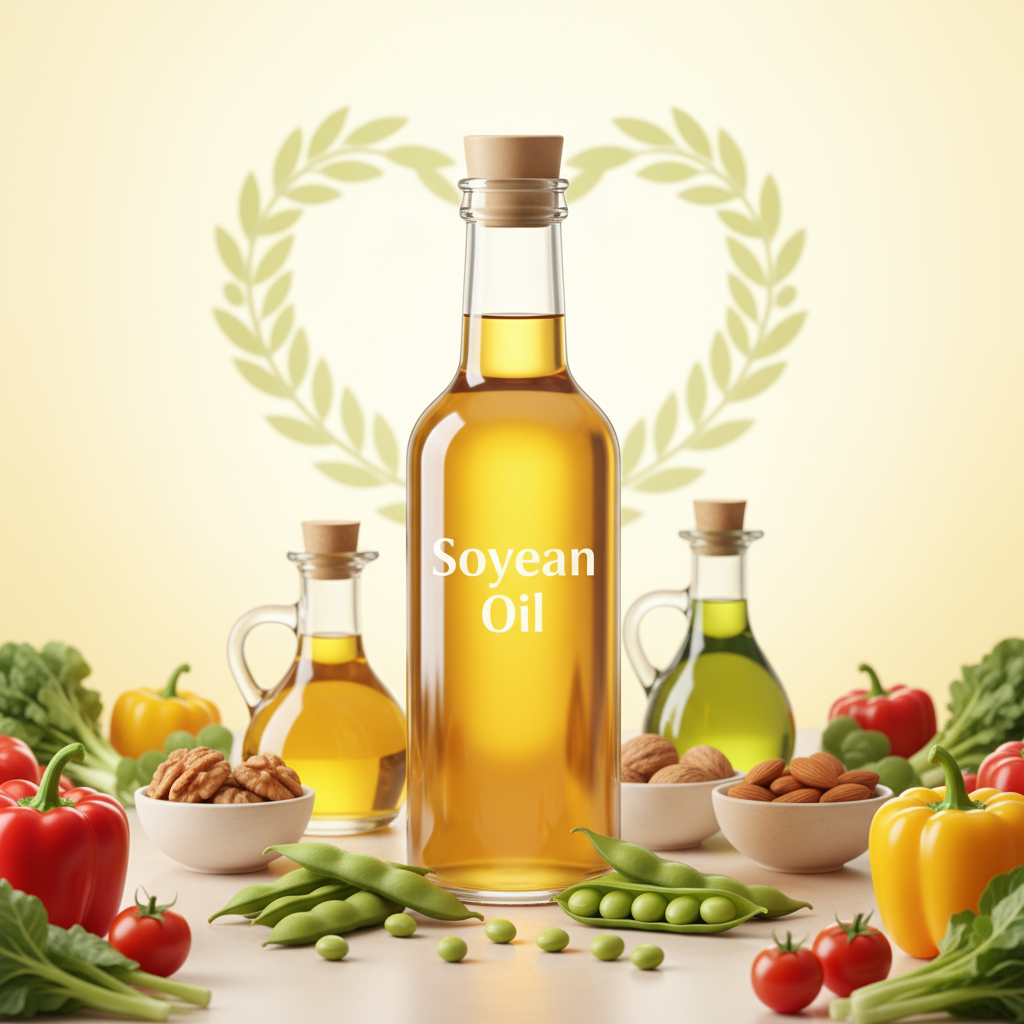
Soybean Oil vs. Canola Oil: A Comprehensive Comparison
TL;DR
Soybean oil and canola oil are both popular cooking oils with distinct nutritional profiles and culinary uses. While they are similar in calorie content, soybean oil is higher in polyunsaturated fats, whereas canola oil is richer in monounsaturated fats. Both oils contain essential fatty acids and vitamins, but canola oil is often considered a healthier option due to its lower saturated fat content. This article delves into their nutritional differences, health impacts, and cooking applications to help you make an informed choice.
With the plethora of cooking oils available today, choosing the right one can be a daunting task. Among the most commonly used oils are soybean oil and canola oil. Both oils are derived from plants and are often used in cooking and food preparation. This article explores the differences between soybean oil and canola oil, focusing on their nutritional profiles, health impacts, and suitable cooking methods.
Both soybean oil and canola oil are 100% fat, providing approximately 884 calories per 100 grams. A typical serving size of either oil (about 1 tablespoon) contains roughly 14 grams of fat and 124 calories.
Both oils are good sources of essential fatty acids, including omega-3 and omega-6. However, the balance of these fatty acids differs:
Research indicates that oils rich in monounsaturated fats, like canola oil, may help reduce bad cholesterol levels and lower the risk of heart disease. In contrast, while soybean oil is not harmful when consumed in moderation, its higher saturated fat content may not be as beneficial for heart health as that of canola oil (Harvard Health).
A study referenced in the article "Is Canola Oil Healthier Than Soybean Oil?" discusses the health impacts of these oils on liver fatty acid accumulation. While both oils have been shown to support health when used correctly, canola oil may have an edge in reducing inflammation and liver fat accumulation compared to soybean oil (Chromatography Today).
The smoke point of an oil is crucial when determining its suitability for various cooking methods.
Canola oil has a neutral flavor, making it versatile for various dishes without altering the taste. Soybean oil, while also neutral, may impart a slightly different flavor depending on the processing method.
When comparing soybean oil and canola oil, both have their merits and can be included in a balanced diet. Canola oil is often favored for its higher monounsaturated fat content and better omega-3 to omega-6 balance, making it a healthier option for heart health. Soybean oil, while still a viable choice, is higher in polyunsaturated fats and saturated fats, which may not be as beneficial when consumed in larger quantities. Ultimately, the best choice depends on individual dietary needs and cooking methods.
Soybean oil is higher in polyunsaturated fats and saturated fats, containing about 14.9 grams of saturated fat per 100 grams. In contrast, canola oil is richer in monounsaturated fats, with around 7.4 grams of saturated fat, making it a healthier option for reducing saturated fat intake.
Canola oil is generally considered better for heart health due to its higher monounsaturated fat content, which can help lower bad cholesterol levels. While soybean oil is safe in moderation, its higher saturated fat content may not be as beneficial for heart health.
Soybean oil has a high smoke point of 256°C (493°F), making it suitable for high-heat cooking methods like frying. Canola oil, with a smoke point of around 204°C (400°F), is versatile for general cooking but less ideal for deep frying.
Canola oil has a neutral flavor, making it versatile for various dishes without altering the taste. Soybean oil is also neutral but may impart a slightly different flavor depending on its processing method.

Is Soybean Oil Healthy? A Comprehensive Guide
TLDR Soybean oil is a widely used cooking oil known for its high levels of unsaturated fats and omega fatty acids. It carries an FDA-qualified health claim suggesting it may reduce the risk of coronary heart disease when consumed ...

How is Soybean Oil Processed? A Comprehensive Guide
TL;DR Soybean oil, a versatile and widely used cooking oil, is processed through a three-step method: cleaning, dehulling, and oil extraction. The extraction can be done via mechanical pressing or solvent extraction, often using h...

Is Soybean Oil Soy? Understanding the Connection
TL;DR Soybean oil is indeed derived from soybeans, which are legumes. While soybean oil is commonly used in cooking and food production, it is important to note that highly refined soybean oil typically does not trigger allergies ...

Is Soybean Oil Good for Skin? Exploring Its Benefits and Risks
TL;DR Soybean oil is a popular ingredient in skincare products due to its moisturizing, anti-inflammatory, and anti-aging properties. It is rich in essential fatty acids and vitamin E, making it beneficial for dry and irritated sk...
Ready to source an ingredient?
Whether you’re struggling to find the perfect ingredient, racing against the clock, or simply don’t have the bandwidth to manage sourcing — we’ve got your back.
Get a Free Sourcing AuditSavings is BIG but the relationship value is MASSIVE! Glad we met when we did. Looking forward to building this partnership with you and David.
Yohan, here to say you’re one of my favorite suppliers. Aside from your high quality ingredients, you’re so great to work with. Thanks for all the help you’ve given us this year.
Working with Global Savors and Yohan has been very smooth when sourcing ingredients. They offer a great selection and and cost savings! Yohan has been awesome to work with and we look forward to continuing business together.






Global Savors is your trusted partner for seamless ingredient sourcing, offering end-to-end solutions that streamline procurement, simplify logistics, and elevate your supply chain efficiency.
View More News
© 2026 Copyrights by Global Savors. All Rights Reserved

